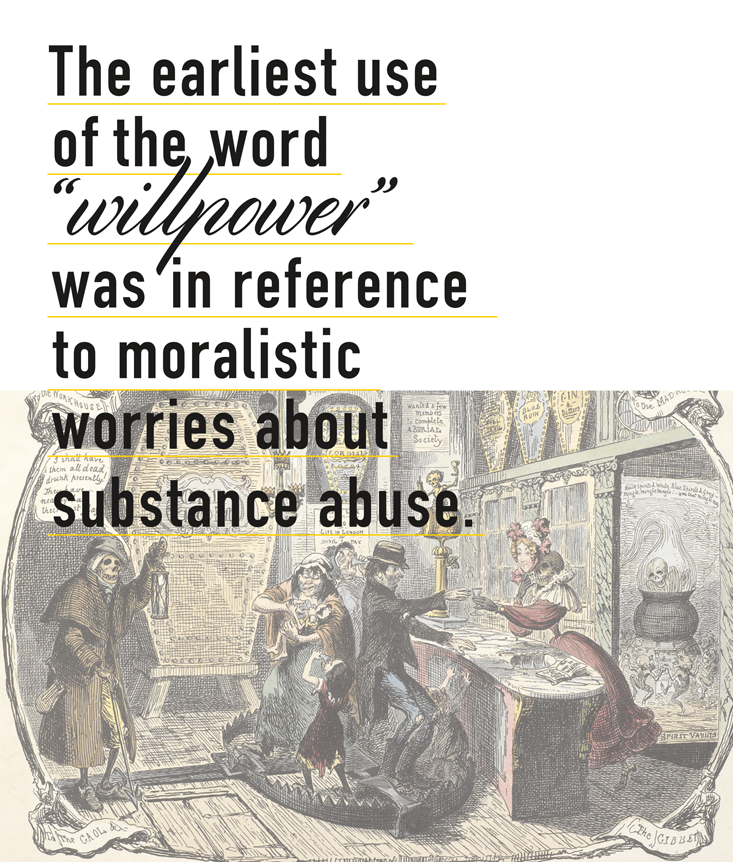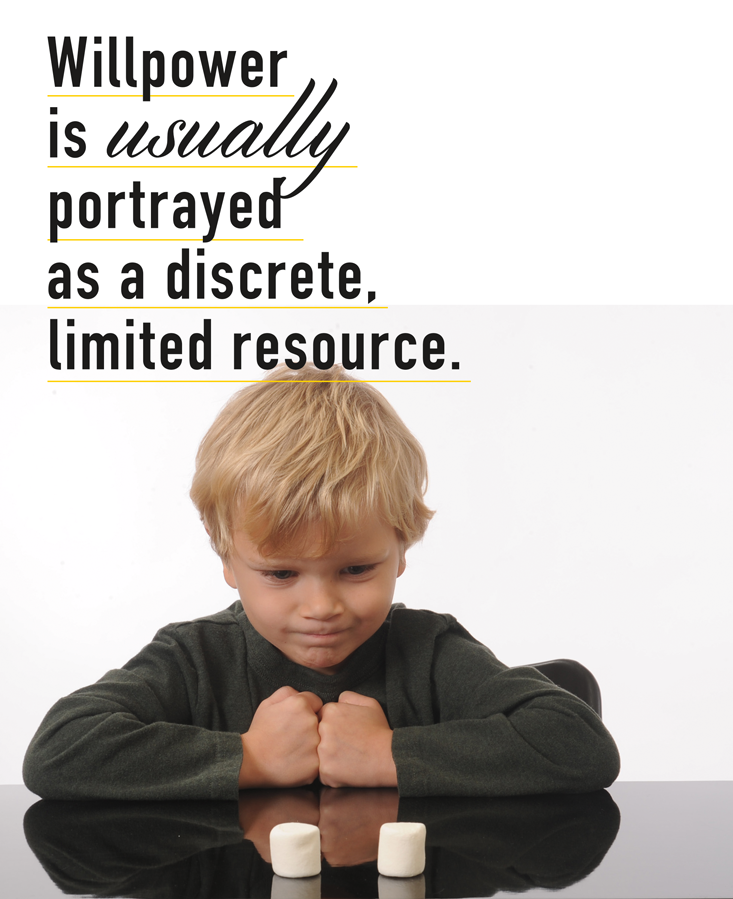Willpower is a harmful and outdated term that must be eliminated.

Thomas (fictitious names) was a very successful and calm lawyer, worried about his addiction to alcohol. When he came to me for a psychotherapy session, he consumed 6-7 glasses of wine in the evening, and he was already starting to hide this habit from home and feel its influence on his work. We discussed treatment strategies and made a new appointment. But when he returned two weeks later, he was completely depressed: with alcohol consumption, nothing has changed.
“I just can’t limit myself. I guess I have no willpower. ”
')
Another patient, John, also initially approached me because of alcohol addiction. At the first meeting, we discussed approaches based on moderation and the appointment of healthier restrictions. But a month later he came to me to say that he had changed his mind and put up with his alcoholic habits. His wife was not always happy with the amount of alcohol he had drunk, and sometimes he suffered a hangover, but the relationship was quite strong and alcohol did not cause him serious problems.
In essence, John and Thomas are similar: they both succumbed to short-term temptation and did not withstand their long-term aspirations. But Thomas attributed the failure to the problems with willpower, and John revised his behavior from a perspective that completely dismisses the concept of willpower. John and Thomas will solve their problems as a result, but in very different ways.
Most people will be satisfied with the explanation of Thomas. They will agree with his self-diagnosis (lack of willpower), and even call him objective and bold. It seems to many that John’s revision of his problem was simply self-deception, hiding the real problem. But the approach of Thomas must be treated with the same skepticism as the approach of John. It is quite possible that Thomas was seduced by the almost mystical status of willpower imparted to her by modern culture - and as a result, this idea worked against him.
To most patients and psychologists, ignoring the idea of will power seems absurd, but I, as a practicing psychiatrist specializing in addiction and an assistant professor of clinical psychiatry, are increasingly skeptical about the concept of willpower and worry about the obsession with the self-help epidemic surrounding it. . Countless books and blogs offer ways to "increase self-control," or even "increase willpower through meditation," but few admit that a new study showed that some of the ideas underlying these methods turned out to be inaccurate.
The generally accepted and fundamental definition of willpower distracts us from the minute details of self-control and is dangerous because harmful myths can inflate - for example, the idea that willpower is finite and can be wasted. Willpower is a mixed concept linking a wide range of unrelated cognitive functions. The more we look at it, the weaker it looks. It's time to get rid of her completely.
The roots of willpower and self-control grow from Western culture and are drawn to early Christianity, when theologians such as Aurelius Augustine used the idea of free will to explain how sin can be compared with an omnipotent deity. Later, when philosophers became distracted from religion, the thinkers of the Enlightenment , especially David Hume, tried to reconcile free will with the prevailing ideas of scientific determinism.
The concept of willpower did not appear until the Victorian era , as Roy Baumeister, a psychology researcher of the time, describes in his book Willpower: Rediscovery of the Greatest Human Power [Willpower: Rediscovering the Greatest Human Strength]. In the 19th century, the decline of religion, an increase in population and widespread poverty led to social tensions over whether lower levels of society were required to maintain proper moral standards. Self-control became an obsession of the Victorian era, it was advertised by such publications as the incredibly popular 1859 book Self-Help, which promoted the value of selflessness and relentless persistence. The Victorians adopted the idea directly from the industrial revolution and described willpower as the tangible force that feeds the engine of our self-control. Those who lacked willpower were despised. The earliest mention of this word, according to the Oxford Dictionary, occurs in 1874 in connection with moralistic concerns about certain substances: "Drunkards, whose willpower and moral strength were subdued by degraded appetite."

At the beginning of the 20th century, when psychiatry tried to establish itself as a legitimate area with a scientific basis, Freud developed the idea of " superego ". The superego, or super-I, is the closest psychoanalytic relative of willpower, representing the critical and moralizing part of consciousness learned from parents and society. It deals with the basic functions of self-control — spending psychic energy in confronting id (it) —but also associated with broader ethical and evaluative judgments. Although Freud is often associated with the rejection of Victorian views, the super-I represents the quasi-scientific continuation of the Victorian ideal. By the middle of the century B.F. Skinner suggested that there was no inner freedom to control behavior. Academic psychology followed the path of behaviorism , and the concept of free will was abandoned.
Perhaps, the story of willpower would have ended there, if not for some unexpected discoveries that occurred in the next decades and revived interest in self-control. In the 1960s, American psychologist Walter Michel decided to test how children deal with a deferred reward before the temptation of sweets in his famous " experiment with marshmallows ." Young subjects were offered a choice between one sweets immediately, or two - a little later. Only many years later, when he heard stories about how some of his subjects study and work, did he decide to find them all and collect data on their achievements. He found that children who were able to resist temptation learned better and passed tests [1]. This spurred the interest of scientists to the idea of "self-control", the generally accepted term for willpower, used in psychological research.
These works prepared the ground for the emergence of a modern definition of willpower, which is described in the media and in scientific circles as the ability for instant self-control — the conscious suppression of sudden impulses and desires. Or, as members of the American Psychological Association described in a recent report: "the ability to resist short-term temptations to achieve long-term goals." This feature is described as a discrete and limited resource that can be exhausted, like some kind of energy source. The concept of limited resources apparently arose from Judeo-Christian ideas of opposing sinful desires, and looks like a natural analogy to other physiological properties, such as strength, endurance, or breath. In the 1990s, psychologist Roy Baumeister conducted a key experiment to describe this possibility, which he called "ego depletion." Several students had to resist the urge to eat fresh chocolate chip cookies, and ate radishes instead, while others were free to eat cookies. Students who performed poorly in the experiment, then coped worse with other psychological tests, which led to the conclusion that they had exhausted some final cognitive resource.
The supporting ego-depleting effect of the research was allegedly reproduced dozens of times, from which various well-selling books (including Baumeister’s own book, Willpower) and endless research programs grew. But a meta-analysis of 2015, in which these studies were carefully studied together with other, not previously published works, found a very large bias of work and very little evidence of the reality of the ego-depletion phenomenon [2]. Then, psychologists conducted an international experiment on ego depletion, in which more than 2,100 subjects participated. Recent results do not confirm the existence of evidence for the reality of this phenomenon [3]. Apparently, this is another victim of the crisis of reproducibility of psychological research.
If the ego depletion is refuted, it is surprising how firmly it settled in the mind before more thorough research has dispelled the assumptions on which it holds. The history of its rise and fall shows how wrong assumptions about the nature of willpower not only lead us in the wrong place, but also cause harm. Related research shows that faith in will power affects self-control. The subjects, who believed in the possibility of ego depletion (in that willpower is a limited resource), showed a decrease in self-control during the experiment, and those who did not believe in ego depletion remained unchanged. Moreover, when the subjects subconsciously, through hints in the questionnaires, hint at the possibility of ego depletion, their results also become worse.
The problem of the modern concept of willpower extends much further than the exhaustion of the ego. The usual scientific simplifications associated with willpower are threatened. In a frequently cited work of 2011, Kentaro Fujita called on psychologists to stop conceptualizing self-control as simply costly suppression of impulses, and recommended to colleagues to think more broadly in terms of long-term motivation [4]. For example, some behaviorists and economists believe that self-control should be viewed not only as the suppression of sudden desires, but as a process of “intrapersonal trade”: a person has a conflict of several decision-making systems. This model allows you to change priorities and motivations in time - this is exactly what happened with John, who said that he simply revised his view on alcohol problems, recounting all the pros and cons.

Another unnoticed aspect of self-control is the management of emotions, an area of science that has been strongly developed over the past few decades. Since the early 1990s, the number of works cited has increased fivefold every five years. This component of self-control is also ignored from the point of view of willpower as a kind of muscle that dominates current discussions. Intuitively, it should be clear that emotions are a component of willpower. Stop yourself and not shout at the annoying relative - this is not the same as resisting the desire to drink. Emotional self-government is a complex function, and, as we have long known in the psychological field, an attempt to control your emotional state with brute force is doomed to failure. Instead, managing emotions includes skills such as shifting attention (distraction), modulating a psychological response (deep breathing), being able to tolerate and wait out negative emotions, changing beliefs.
The paradigmatic example of a change of convictions is the phenomenon of “pending discounting,” in which people tend to diminish future rewards, preferring smaller, but instant profits. If you offer a person $ 5 now or $ 10 in a month, many people do not take an instant reward. But if you reformulate the question, clearly defining a compromise: “Do you want to get $ 5 today and $ 0 in a month, or $ 0 today and $ 10 in a month?”, Then more people choose the larger, although deferred, reward. Studies show that the reformulation of a question pushes people to a deferred award, since different versions of the question work with different cognitive processes. In a study with neuroimaging, in the second version of the question, not only does the response of the parts of the brain responsible for the reward decrease, but the activity of the dorsolateral frontal cortex, which is associated with self-monitoring, requires less effort [5]. A conscious reformulation of the problem in this way would be an example of willpower, but would not fall into the generally accepted understanding of the term. Instead of building on a challenging impulse effort, this willpower forces the individual to rethink the problem and avoid the very need to fight.
These hidden aspects of willpower raise the question of the legitimacy of the entire concept of a term as a whole, and lead us to a situation where everyone loses. Either our definition of willpower is too narrowed and simplified to uselessness, or it can be used as an imprecise term based on a contradictory mixture of different mental processes. Willpower can be a pre-scientific idea — born in social and philosophical reasoning, not in research, and fostered before it can be experimentally verified. The term has survived in modern psychology, since it is intuitively associated with our imagination. The image of willpower as a kind of muscular power coincides with some limited examples, such as resistance to desires, and this analogy is supported by social expectations, stretching from Victorian moralism. But these destructive ideas distract us from more accurate ways of understanding human psychology and even from our attempts to conduct meaningful self-control. The best way to move forward is to abandon the concept of “willpower” altogether.
This will give up a significant moral burden. With the concept of willpower, it is easy to label. It becomes permissible to destroy social support of the population, if we consider poverty, as a problem of financial discipline, or health - as a personal discipline. An extreme example is the punitive approach to our endless war on drugs, which denies the problems of using drugs as a result of a personal choice. Unhealthy moralism penetrates into the most ordinary corners of society. When the US began to worry about garbage in the 1950s, the American Can Company and other corporations sponsored the "Keep America's Beautiful" campaign to divert attention from the fact that they produce a huge amount of cheap, disposable and profitable packaging, and transfer the blame for trash on individuals. It is easiest to throw moral charges about willpower.
As a result, it is not necessary to believe in will power. When I hear “willpower,” I have a mental red flag that makes me clarify this concept. Did my patient, Thomas, have a problem with willpower? When he struggled with the desire to drink, he had no problems with positive motivation, with the continuation of an extremely successful career and sports - he won several regional competitions in New York. His difficulties in suppressing the desire to drink were not related to his ability to stick to the plan. Some researchers call this property "self-discipline" and distinguish in it the control of impulses or resistance to temptation. Which of these cognitive functions is “will power”? To ask such a question means not to understand the essence.
He finished well. When we dealt in detail with the problems that caused him to drink, it became clear that he did not understand how much stress affects his life. He not only tortured himself, believing that he simply had to force himself to quit, but also fed unrealistic ideas about what he should achieve at work, at home and in other places. Concentrating on the big picture — managing stress and anxiety, and polling his own expectations — he eventually managed to reduce his alcohol intake without feeling such a strong struggle.
And he did all this without any particular excitement about willpower.
Links
1. Mischel, W., Shoda, Y., & Rodriguez, ML Delay of Gratification in Children. Science 244, 933-938 (1989).
2. Carter, EC, Kofler, LM, Forster, DE, McCullough, ME A series of effects: Self-control doesn’t have to do. Journal of Experimental Psychology: General 144, 796-815 (2015).
3. Hagger, MS & Chatzisarantis, NL A multi-lab pre-registered replication of the ego-depletion effect. Perspectives on Psychological Science 11, 546-573 (2016).
4. Fujita, K. On conceptualizing self-control as more than the effortful inhibition of impulses. Personality and Social Psychology Review 15, 352-366 (2011).
5. Magen, E., Kim, B., Dweck, CS, Gross, JJ, & McClure, SM. Proceedings of the National Academy of Sciences 111, 9786-9791 (2014).
Source: https://habr.com/ru/post/401325/
All Articles